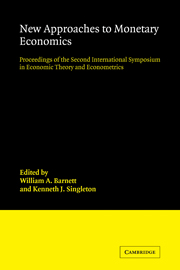 New Approaches to Monetary Economics
New Approaches to Monetary Economics Book contents
- Frontmatter
- Contents
- Editors' introduction
- List of contributors
- Part I Transactions motivated monetary holdings in general equilibrium
- 1 Monetary dynamics with proportional transaction costs and fixed payment periods
- 2 A multiple means-of-payment model
- 3 Credit policy and the price level in a cash-in-advance economy
- Part II Financial intermediation
- Part III Monetary aggregation theory
- Part IV Issues on aggregate fluctuations
- Part V Theoretical issues in the foundations of monetary economics and macroeconomics
1 - Monetary dynamics with proportional transaction costs and fixed payment periods
Published online by Cambridge University Press: 04 August 2010
- Frontmatter
- Contents
- Editors' introduction
- List of contributors
- Part I Transactions motivated monetary holdings in general equilibrium
- 1 Monetary dynamics with proportional transaction costs and fixed payment periods
- 2 A multiple means-of-payment model
- 3 Credit policy and the price level in a cash-in-advance economy
- Part II Financial intermediation
- Part III Monetary aggregation theory
- Part IV Issues on aggregate fluctuations
- Part V Theoretical issues in the foundations of monetary economics and macroeconomics
Summary
Introduction
A general equilibrium model of an economy is presented where people hold money rather than bonds in order to economize on transaction costs. It is not optimal for individuals to instantaneously adjust their money holdings when new information arrives. This (endogenous) delayed response to new information generates a response to a new monetary policy which is quite different from that of standard flexible price models of monetary equilibrium. Though all goods markets instantaneously clear, the transaction cost causes delayed responses in nominal variables to a change in monetary policy. This in turn causes real variables to respond to the new monetary policy.
Earlier work by Grossman and Weiss (1983), Grossman (1982), and Rotemberg (1984) have considered models of the above type where individuals hold money for an exogenously fixed amount of time – their “payment period.” As in the model to be developed here, these models assume that goods can be bought only with cash. However, unlike what we will assume here, individuals can exchange bonds for cash only on the exogenously fixed “paydates” which occur at the beginning and end of their payment periods. Thus an individual's money holding period is exogenously given and insensitive to the nominal interest rate. In such models, when there is an unanticipated increase in the money supply, people can be induced to hold the new money only by a large fall in the real rate of interest.
- Type
- Chapter
- Information
- New Approaches to Monetary EconomicsProceedings of the Second International Symposium in Economic Theory and Econometrics, pp. 3 - 41Publisher: Cambridge University PressPrint publication year: 1987
- 9
- Cited by


